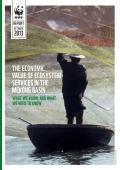
In October 2013, Ontario Premier Kathleen Wynne announced her government’s plan to issue green bonds. The Government of Ontario will be the first province in Canada to issue green bonds, but not the first government agency in Canada to do so. Export Development Canada issued a green bond in January 2014, and TransLink, Metro Vancouver’s regional transportation authority, has issued very similar bonds without adding the ‘green’ label. The Ontario government plans to use the bond proceeds for investment in "transit and other environmentally friendly infrastructure projects across the province." At press time, the Government of Ontario had not released further details regarding the specific allocation of the bonds’ proceeds.

In green economies, natural capital is incorporated into measurement of societal progress and equity, and recognized and managed as a fundamental pillar of economic and human well-being. The Lower Mekong region must demonstrate success in living up to commitments to maintain ecosystem integrity before claims to having ‘greened’ growth can be made. A first step in making this commitment is ensuring that there is adequate information available on the socioeconomic importance of ecosystems and the services they provide. Ecosystem services valuation is a basic component of the evidence base for decisions to invest or divest in maintaining natural systems.

This report advocates placing REDD+ into a larger landscape scale planning framework that can, and should, involve multiple sectors (especially those that are driving deforestation, sometimes inadvertently). This would go beyond forests to also serve the needs of energy, water resources, agriculture, finance, transport, industry, trade, cities, and ultimately all sectors of a modern economy. REDD+ would thereby add value to many other initiatives that are being implemented within these sectors. No longer simply an intriguing pilot effort, REDD+ would take its place as a critical element in a Green Economy.
The private sector is increasingly being engaged in climate finance and climate-related activities. Private sector opportunities for engagement in climate change adaptation are less clear than for mitigation, particularly in developing countries. This article first conceptualizes private sector engagement in adaptation by exploring (1) different roles of the private sector in adaptation in developing countries and (2) the way governments can create an enabling environment to increase private sector engagement. Second, it analyses how 47 least developed countries (LDCs) envisage the role of the private sector in their National Adaptation Programmes of Action (NAPAs). This article argues that private sector engagement in adaptation is often inevitable and potentially significant. Yet, the results show that it receives little attention in NAPAs.
